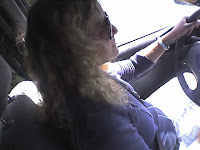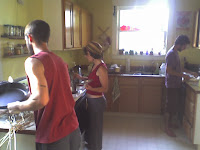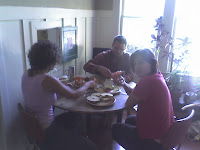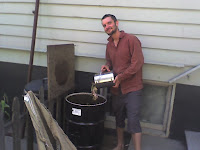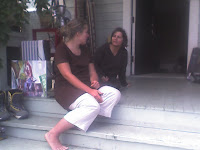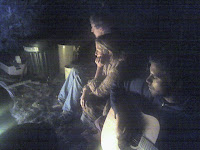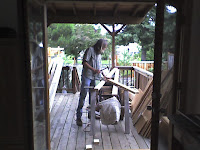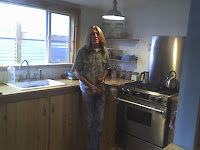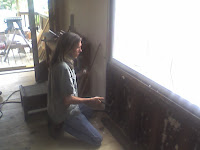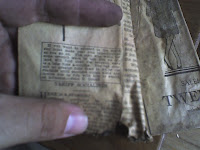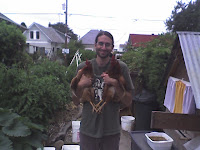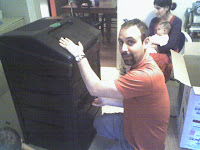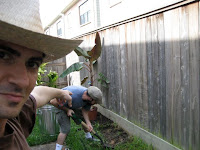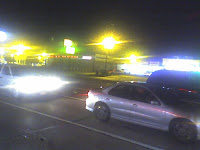
I think it's important to note that I have a car...a gasoline one. It's a 1991 volvo wagon, which I purchased for $1300 a few months ago. It's gets about 27 miles to the gallon on the highway. Not too bad for an old car. " According to the
National Highway Traffic Safety Administration (NHTSA) the average gas mileage for new vehicles
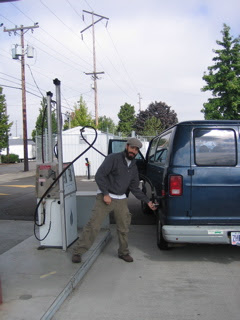
sold in the United States has 23.1 miles per gallon (mpg) in 1980 to 24.7 in 2004. This represents a paltry increase of slightly less than 7% over the 25 year period."
Last month, I sold my methane powered van to a non-profit organization in Austin, TX . I wrote an article about it in my
music blog. I used it for four years as a touring vehicle ( I'm a musician ). CNG ( compressed natural gas ) has 90 % less harmful emissions that a gasoline vehicle, but the infracture hasn't been supported by the industry or the government, thus the existing pumps are slowly shutting down. This led me to sell the vehicle, being that I couldn't get out to West Texas, where I am building a
geodesic dome in the desert.
So now, the challenge is to find ways to reduce and eventually eliminate car trips as much as possible. This was easy when I lived in Portland, Oregon...a city which planned ahead while putting much focus on mass transit and pedestrian infratructure.
This week, I am visiting family in Houston, arguably the car capital of the world. I grew up in this city. At the time, I didn't have any place to campare it to, other than Johannesburg ( also a car-centric city ), where I was born.
To get here from Austin, I drove. The other options are to take the Greyhound, or fly. There is no train from Austin to Houston, though there would have been if Tom Delay didn't pull the proposal for high speed rail from a Texas Ballot. I also had equipment to haul ( instruments, etc ), therefore I decided to drive...but not before placing a rideshare ad on craigslist.
The ad was fairly last minute and I didn't think that I would get a response before leaving, but I did...right as I was leaving. I called Kira, and we discovered that we were both at the Kerrville Folk Festival and have friends in common. She felt more comfortable knowing that I was not a murderer, so I swung by her place to fetch her, and her big heavy backpack and guitar. Not only did we have alot to talk about ( folk music, natural building, travelling in Israel ), but we both saved money and time by sharing the ride. And having an extra person in the car doubled my car's fuel efficiency per person.
Growing up mostly in Houston, I don't think I took the bus even once. After living in Portland, Oregon for that last four years and getting used to having exceptional mass transit, I decided to try the Houston bus for the first time a few months ago in a previous visit. I was pleasantly surprised, after having very low expectations. I took the bus downtown from far West
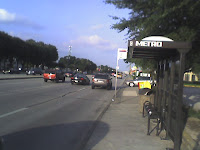
Houston. It's not close. It took the bus 50 minutes, which means that it's almost 2 hours round trip. In a car, this would take about 25 minutes each way, or about half the time. This is a pretty consistent formula, I've found. How ever long it takes in a car, it will take double the time on the bus. However, in a car, the time is strictly spent focusing on driving ( hopefully ). It's wasted time. On the bus, I can make/return phone calls, read, and write. Since I can sometimes get motion sickness while reading, I have books on tape, which I can play though my phone. One also has to factor in the time that it takes to work to earn the money that it costs to drive any distance. In this department, the bus wins again. On the bus, there are also opportunities to relax, wind down, wake up, meet people, and observe people in passing cars. One can let their minds and eyes wonder in ways that they can't when having to focus on the road.
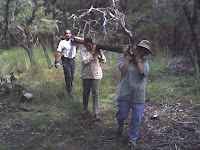 Here in Central TX, Ceder trees grow everywhere. Some consider them to be invasive, since they are not native to the area. They are known to horde water even. Yet, they continue to multiply. They are very beautiful trees and happen to make excellent wood for building. In setting up for the Texas Natural Building Colloquium, taking place in Kerrville TX, we spent a few days harvesting Cedar Trees from a neighbor's ranch. Harvesting Cedar Trees in Central TX is guilt free. Using mostly human power, we carefully and considerately plucked our trees from an overgrowth, leaving only small gaps where extra sun rays can peek through to help grow smaller trees whose size have been hindered by the shadows of their neighbors. This practice is much preferrable to clear cutting, the industrial standard of quickly capitalizing on lumber with no consideration of the long term effects. They maximize their profits and minimize expenses by taking ALL trees in an area while leaving the earth below to regress quickly into a desert scape that then loses its ability to hold water and plantlife.
Here in Central TX, Ceder trees grow everywhere. Some consider them to be invasive, since they are not native to the area. They are known to horde water even. Yet, they continue to multiply. They are very beautiful trees and happen to make excellent wood for building. In setting up for the Texas Natural Building Colloquium, taking place in Kerrville TX, we spent a few days harvesting Cedar Trees from a neighbor's ranch. Harvesting Cedar Trees in Central TX is guilt free. Using mostly human power, we carefully and considerately plucked our trees from an overgrowth, leaving only small gaps where extra sun rays can peek through to help grow smaller trees whose size have been hindered by the shadows of their neighbors. This practice is much preferrable to clear cutting, the industrial standard of quickly capitalizing on lumber with no consideration of the long term effects. They maximize their profits and minimize expenses by taking ALL trees in an area while leaving the earth below to regress quickly into a desert scape that then loses its ability to hold water and plantlife.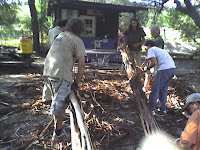 custard colored wood, which Erin the volunteer coordinator refers to as the wood used in Texas country porches. The bark can only easily be stripped within 24 hours of harvesting the tree. After that, as the water dries out of the tree, the bark sticks to the wood like glue.
custard colored wood, which Erin the volunteer coordinator refers to as the wood used in Texas country porches. The bark can only easily be stripped within 24 hours of harvesting the tree. After that, as the water dries out of the tree, the bark sticks to the wood like glue.